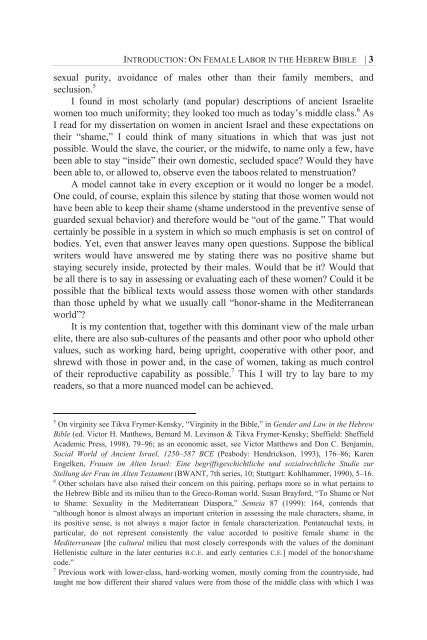Women at Work in the Deuteronomistic History - International Voices ...
Women at Work in the Deuteronomistic History - International Voices ...
Women at Work in the Deuteronomistic History - International Voices ...
Create successful ePaper yourself
Turn your PDF publications into a flip-book with our unique Google optimized e-Paper software.
INTRODUCTION: ON FEMALE LABOR IN THE HEBREW BIBLE | 3<br />
sexual purity, avoidance of males o<strong>the</strong>r than <strong>the</strong>ir family members, and<br />
seclusion. 5<br />
I found <strong>in</strong> most scholarly (and popular) descriptions of ancient Israelite<br />
women too much uniformity; <strong>the</strong>y looked too much as today’s middle class. 6 As<br />
I read for my dissert<strong>at</strong>ion on women <strong>in</strong> ancient Israel and <strong>the</strong>se expect<strong>at</strong>ions on<br />
<strong>the</strong>ir “shame,” I could th<strong>in</strong>k of many situ<strong>at</strong>ions <strong>in</strong> which th<strong>at</strong> was just not<br />
possible. Would <strong>the</strong> slave, <strong>the</strong> courier, or <strong>the</strong> midwife, to name only a few, have<br />
been able to stay “<strong>in</strong>side” <strong>the</strong>ir own domestic, secluded space? Would <strong>the</strong>y have<br />
been able to, or allowed to, observe even <strong>the</strong> taboos rel<strong>at</strong>ed to menstru<strong>at</strong>ion?<br />
A model cannot take <strong>in</strong> every exception or it would no longer be a model.<br />
One could, of course, expla<strong>in</strong> this silence by st<strong>at</strong><strong>in</strong>g th<strong>at</strong> those women would not<br />
have been able to keep <strong>the</strong>ir shame (shame understood <strong>in</strong> <strong>the</strong> preventive sense of<br />
guarded sexual behavior) and <strong>the</strong>refore would be “out of <strong>the</strong> game.” Th<strong>at</strong> would<br />
certa<strong>in</strong>ly be possible <strong>in</strong> a system <strong>in</strong> which so much emphasis is set on control of<br />
bodies. Yet, even th<strong>at</strong> answer leaves many open questions. Suppose <strong>the</strong> biblical<br />
writers would have answered me by st<strong>at</strong><strong>in</strong>g <strong>the</strong>re was no positive shame but<br />
stay<strong>in</strong>g securely <strong>in</strong>side, protected by <strong>the</strong>ir males. Would th<strong>at</strong> be it? Would th<strong>at</strong><br />
be all <strong>the</strong>re is to say <strong>in</strong> assess<strong>in</strong>g or evalu<strong>at</strong><strong>in</strong>g each of <strong>the</strong>se women? Could it be<br />
possible th<strong>at</strong> <strong>the</strong> biblical texts would assess those women with o<strong>the</strong>r standards<br />
than those upheld by wh<strong>at</strong> we usually call “honor-shame <strong>in</strong> <strong>the</strong> Mediterranean<br />
world”?<br />
It is my contention th<strong>at</strong>, toge<strong>the</strong>r with this dom<strong>in</strong>ant view of <strong>the</strong> male urban<br />
elite, <strong>the</strong>re are also sub-cultures of <strong>the</strong> peasants and o<strong>the</strong>r poor who uphold o<strong>the</strong>r<br />
values, such as work<strong>in</strong>g hard, be<strong>in</strong>g upright, cooper<strong>at</strong>ive with o<strong>the</strong>r poor, and<br />
shrewd with those <strong>in</strong> power and, <strong>in</strong> <strong>the</strong> case of women, tak<strong>in</strong>g as much control<br />
of <strong>the</strong>ir reproductive capability as possible. 7 This I will try to lay bare to my<br />
readers, so th<strong>at</strong> a more nuanced model can be achieved.<br />
5 On virg<strong>in</strong>ity see Tikva Frymer-Kensky, “Virg<strong>in</strong>ity <strong>in</strong> <strong>the</strong> Bible,” <strong>in</strong> Gender and Law <strong>in</strong> <strong>the</strong> Hebrew<br />
Bible (ed. Victor H. M<strong>at</strong><strong>the</strong>ws, Bernard M. Lev<strong>in</strong>son & Tikva Frymer-Kensky; Sheffield: Sheffield<br />
Academic Press, 1998), 79–96; as an economic asset, see Victor M<strong>at</strong><strong>the</strong>ws and Don C. Benjam<strong>in</strong>,<br />
Social World of Ancient Israel, 1250–587 BCE (Peabody: Hendrickson, 1993), 176–86; Karen<br />
Engelken, Frauen im Alten Israel: E<strong>in</strong>e begriffsgeschichtliche und sozialrechtliche Studie zur<br />
Stellung der Frau im Alten Testament (BWANT, 7th series, 10; Stuttgart: Kohlhammer, 1990), 5–16.<br />
6 O<strong>the</strong>r scholars have also raised <strong>the</strong>ir concern on this pair<strong>in</strong>g, perhaps more so <strong>in</strong> wh<strong>at</strong> perta<strong>in</strong>s to<br />
<strong>the</strong> Hebrew Bible and its milieu than to <strong>the</strong> Greco-Roman world. Susan Brayford, “To Shame or Not<br />
to Shame: Sexuality <strong>in</strong> <strong>the</strong> Mediterranean Diaspora,” Semeia 87 (1999): 164, contends th<strong>at</strong><br />
“although honor is almost always an important criterion <strong>in</strong> assess<strong>in</strong>g <strong>the</strong> male characters, shame, <strong>in</strong><br />
its positive sense, is not always a major factor <strong>in</strong> female characteriz<strong>at</strong>ion. Pent<strong>at</strong>euchal texts, <strong>in</strong><br />
particular, do not represent consistently <strong>the</strong> value accorded to positive female shame <strong>in</strong> <strong>the</strong><br />
Mediterranean [<strong>the</strong> cultural milieu th<strong>at</strong> most closely corresponds with <strong>the</strong> values of <strong>the</strong> dom<strong>in</strong>ant<br />
Hellenistic culture <strong>in</strong> <strong>the</strong> l<strong>at</strong>er centuries B.C.E. and early centuries C.E.] model of <strong>the</strong> honor/shame<br />
code.”<br />
7 Previous work with lower-class, hard-work<strong>in</strong>g women, mostly com<strong>in</strong>g from <strong>the</strong> countryside, had<br />
taught me how different <strong>the</strong>ir shared values were from those of <strong>the</strong> middle class with which I was




